Water heaters are essential appliances that provide hot water for various needs, such as bathing, cleaning, and cooking. While water heaters are a common household fixture, homeowners often have questions about their functionality, maintenance, and safety. In this post, we’ll cover some of the most frequently asked questions about water heaters and provide clear, concise answers to help you better understand these essential devices.
How does a water heater work?
A water heater operates by heating cold water using a heating element or a gas burner. The hot water is then stored in a tank (in traditional water heaters) or produced on demand (in tankless water heaters). When you turn on a hot water tap, the preheated water flows through the plumbing to the desired outlet.
What are the types of water heaters available?
There are two primary types of water heaters:
- Traditional Storage Tank Water Heaters: These models store and constantly heat water in a large tank until it’s needed. They are available in various sizes to accommodate different household needs.
- Tankless (On-Demand) Water Heaters: Unlike storage tank water heaters, tankless models heat water directly as it flows through the unit. They provide hot water on demand and are generally more energy-efficient.
How long does a water heater last?
The average lifespan of a traditional water heater is around 8 to 12 years, and a tankless water heater typically lasts at least 15 to 20 years. Regular maintenance can extend this service life.
What size water heater do I need for my home?
The size of the water heater you need depends on your household’s hot water demands. A larger family might require a 75 gallon tank, while a smaller household might get by with a 40 or 50 gallon unit. For tankless water heaters, the required size is determined by the flow rate and temperature rise needed to meet your demands.
What should I do if I run out of hot water frequently?
If you frequently run out of hot water, several factors could be at play:
- Your water heater might be undersized for your household needs.
- There could be a malfunctioning heating element or burner.
- Sediment buildup in the tank is reducing its efficiency.
- Issues with the thermostat or dip tube might be affecting water temperature.
Is it necessary to drain the water heater?
Yes, draining the water heater at least once a year is recommended to remove sediment that can accumulate at the bottom of the tank. Sediment buildup can lead to reduced efficiency and corrosion.
Why does my water heater make noise?
A water heater might make popping or rumbling noises due to the heating of sediment in the tank. Flushing the tank can often resolve this issue.
Can I install a water heater myself?
While some homeowners might have the necessary skills to install a water heater, it’s generally recommended to hire a professional plumber for installation. Improper installation can lead to performance issues, safety hazards, and voided warranties.
In conclusion, a well-functioning water heater is crucial for everyday comfort and convenience. By understanding how water heaters work and following proper maintenance practices, you can extend their lifespan, improve energy efficiency, and ensure safe operation. If you have any concerns or issues with your water heater, don’t hesitate to call Platinum today. We are on standby and ready to assist in your time of need—whenever that time may be!
Contact Platinum Plumbing & Heating, Inc. today to schedule an appointment with our pros.

